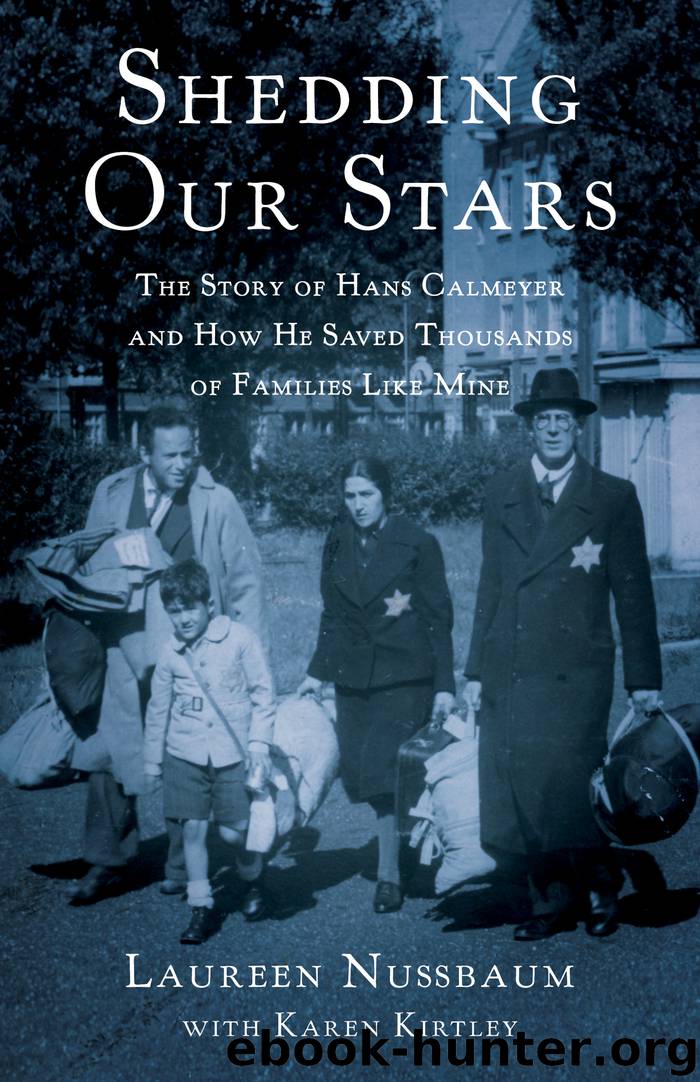Shedding Our Stars by Laureen Nussbaum

Author:Laureen Nussbaum
Language: eng
Format: epub
Publisher: She Writes Press
Published: 2019-03-21T16:00:00+00:00
Chapter Eighteen
WHERE TO FIT IN?
At the end of 1946, Calmeyer was asked by the Osnabrück inspector for the Office of Denazification, a Mr. Goers, to preside over a denazification tribunal. Calmeyer declined the position in a letter dated January 13, 1947:
The damage already done can only be ameliorated by a far-reaching amnesty. There is an urgent need for amnesty. If, however, it is granted because of the embarrassing failure of the present determination of guilt, then amnesty loses all its healing effect. Amnesty must be an act of confidence. A person who places confidence, acquires confidence. … The denazification process in its present form leads to degradation wherever even minor incriminatory evidence is found. That would not be so bad if it applied only to a small circle of persons who are really guilty. However, we are dealing with a very large circle—“one cannot degrade two-thirds of the German people”—and the result is particularly devastating since the whole population of Germany has already been degraded, both economically and socially, by [years of] armament, war, and bombardments. Degraded once again, a person will be more discouraged, more desperate, and, alas, even more self-righteous and unreasonable than a person who carries his burden of guilt—be it acknowledged or not—together with his share of Germany’s economic bankruptcy.
Let me assure you that I do not like to decline the call to serve; yet I believe that I cannot be useful in the position I have been offered but might rather prove harmful.
Hans Calmeyer
Lawyer1
Despite the businesslike tone of Calmeyer’s letter to the inspector, his disappointment in the denazification process is palpable.
Another source of disillusionment soon after his return from the Netherlands, was Calmeyer’s relationship with his wife. In the spring of 1947, Ruth traveled to Switzerland to seek a cure for kidney problems. She had a lover there. When Calmeyer received an offer from Hanover, the capital of Niedersachsen (the state of Lower Saxony that includes Osnabrück), to take a leading position in the Department of Cultural Affairs, he was eager to accept. In a letter of October 7, 1947, Hans implored Ruth to return from Switzerland and accompany him to Hanover.2 She declined, leaving it to her husband to decide whether he wanted the assignment badly enough to go alone.
More likely than not, these two basic disappointments set the tone for Hans Calmeyer’s life after the war. All too soon, little was left of the eagerness for a constructive role in rebuilding his country and of the zest for life expressed in his last letter home from Dutch internment.
Calmeyer had access to the world of art, particularly to that of literature, which was to become his refuge when he found himself unable to make a meaningful contribution to his country’s rise from its ashes. Already in his letter of December 15, 1946, to his friend Erdmann, Calmeyer referred to his own incarceration in terms of Thomas Mann’s cycle of novels Joseph and His Brothers, ending his reflection with a quotation from the poet Rilke.
In
Download
This site does not store any files on its server. We only index and link to content provided by other sites. Please contact the content providers to delete copyright contents if any and email us, we'll remove relevant links or contents immediately.
| Africa | Asia |
| Canadian | Europe |
| Holocaust | Latin America |
| Middle East | United States |
Fanny Burney by Claire Harman(25784)
Empire of the Sikhs by Patwant Singh(22173)
Out of India by Michael Foss(16312)
Leonardo da Vinci by Walter Isaacson(11903)
Small Great Things by Jodi Picoult(6095)
The Six Wives Of Henry VIII (WOMEN IN HISTORY) by Fraser Antonia(4791)
The Wind in My Hair by Masih Alinejad(4424)
The Lonely City by Olivia Laing(4120)
The Crown by Robert Lacey(4105)
A Higher Loyalty: Truth, Lies, and Leadership by James Comey(4033)
The Iron Duke by The Iron Duke(3639)
Millionaire: The Philanderer, Gambler, and Duelist Who Invented Modern Finance by Janet Gleeson(3569)
Sticky Fingers by Joe Hagan(3454)
Alive: The Story of the Andes Survivors by Piers Paul Read(3312)
Papillon (English) by Henri Charrière(3270)
Joan of Arc by Mary Gordon(3259)
Stalin by Stephen Kotkin(3086)
Aleister Crowley: The Biography by Tobias Churton(3021)
Ants Among Elephants by Sujatha Gidla(2925)
